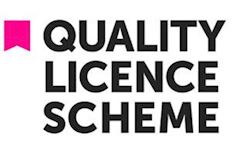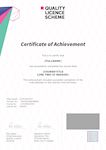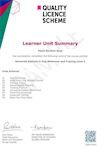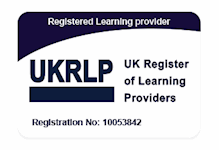Level 3 Certificate in Teaching Assistant - Assessment for Learning
Accredited by The Quality License Scheme | Endorsed Certificate | Certified Unit Summery | No Hidden Fees
Global Edulink
Summary
- Exam(s) / assessment(s) not included in price, and must be purchased separately
Overview
Level 3 Certificate in Teaching Assistant - Assessment for Learning
This course is endorsed under the Quality Licence Scheme.
Stand the chance to get a free Level 3 or above course when you enroll with us!!!
Assessment for learning is a mainstay in educational settings. It is a central premise to use formative assessment to develop learning. Assessment for Learning – Certificate in Teaching Assistant Level 3 course is designed to focus on the reasons for using assessment for learning within an educational environment. The course highlights the importance of dialogue within a classroom. It is a crucial component and key to create a setting where questions are carefully chosen to give students the opportunity to think and express themselves.
Assessment for Learning – Certificate in Teaching Assistant Level 3 course will feature key topics such as the difference between formative and summative assessment, understand the benefits of assessment for learning and understand how to support the assessment for learning.
Teaching assistant is a highly rewarding career for individuals who want to work with children and share their knowledge in a classroom setting. The course will educate learners to check how understanding is progressing within a learning environment. Assessment for Learning – Certificate in Teaching Assistant Level 3 course will give individuals an opportunity to achieve a career in the education industry, in the shortest possible time.
The course has been endorsed under the Quality Licence Scheme. This means that Global Edulink has undergone an external quality check to ensure that the organisation and the courses it offers, meet defined quality criteria. The completion of this course alone does not lead to a regulated qualification* but may be used as evidence of knowledge and skills gained. The Learner Unit Summary may be used as evidence towards Recognition of Prior Learning if you wish to progress your studies in this subject. To this end the learning outcomes of the course have been benchmarked at Level 3 against level descriptors published by Ofqual, to indicate the depth of study and level of demand/complexity involved in successful completion by the learner.
The course itself has been designed by Global Edulink to meet specific learners’ and/or employers’ requirements which cannot be satisfied through current regulated qualifications. The Quality License Scheme endorsement involves robust and rigorous quality audits by external auditors to ensure quality is continually met. A review of courses is carried out as part of the endorsement process.
*Regulated qualification refers to those qualifications that are regulated by Ofqual / CCEA /Qualification Wales
We are always thinking of ways in which you can gain the best from our online learning platform. When you enroll with us on this program you will have the opportunity to enroll on a Level 3 course or above for free!!! The courses that you can choose from have been indicated on our suggested course below.
- Teaching Assistant - Children and Young Individual’s Health and Safety
- Teaching Assistant - Child and Young Individual Development
- Teaching Assistant - Wellbeing of Children and Young People
- Teaching Assistant - Personal Development in Health, Social Care or Children’s and Young Individuals
- Teaching Assistant - Support Learning Activities
- Teaching Assistant - Children and Young individual’s Positive Behaviour
- Teaching Assistant - Professional Relationships with Children, Young Individuals and Adults
- Teaching Assistant - Equality, Diversity and Inclusion in Work with Children and Young Individuals
- Teaching Assistant - Working in Schools Environment
- Teaching Assistant - Communication and Professional Relationships with Children, Young Individuals and Adults
- Diploma in Teaching Assistant – Level 4
Achievement
Course media
Description
What is covered in this course?
- The role and responsibilities of a teaching assistant and what it takes to hold that position.
- There are many ways to assess the understanding of learners and how they are progressing.
- Learn how assessment for learning can contribute to future learning carried out by the teacher and teaching assistant.
- Use clear examples to discuss personalised learning goals.
- Use assessment opportunities to make judgment on how learners are participating and the progress they are making.
- Learn to offer constructive feedback to help learners understand what they have done well.
Course Curriculum (Type Of Course Material: Text)
Module 1
Compare and contrast the roles of the teacher and the learning support practitioner in assessment
Of learners’ achievements
- Role of teacher in assessments
- Help pupils understand when they have succeeded
- Monitor and assess achievement
- Demonstrate high expectations
- Deliver opportunities for reflection and improvement
- Role of teaching assistant in assessments
- Providing feedback to teacher and learners
- Supporting peer and self - assessment
- Guiding learning and helping pupils understand what is needed
Module 2
Summarise the difference between formative and summative assessment
- The aims of formative and summative assessments
- Types of summative assessment
- Types of formative assessment
Module 3
Explain the characteristics of assessment for learning
- Assessment for learning characteristics
- Clarity of goals and success criteria
- The right style of questioning
- Constructive feedback that helps them
- Time to absorb learning
- Reflection and self - monitoring
- All responses have value
- Promoting confidence
Module 4
Explain the importance and benefits of assessment for learning
- Benefits of assessment for learning for pupils
- Pupil attainment
- Improved relationship with learning
- Confidence increases
- Self-responsibility in learning
- Motivational improvements
Module 5
Explain how assessment for learning can contribute to planning for future learning carried out by:
- The teacher
- The learners
- The learning support practitioner
Module 6
Obtain the information required to support assessment for learning
Module 7
Use clear language and examples to discuss and clarify personalised learning goals and criteria for assessing progress with learners
- Modelling
- Questioning
- Explaining
Module 8
Use assessment opportunities and strategies to gain information and make judgments about how well learners are participating in activities and the progress they are making
- Questioning
- Observing
- Discussing
- Analysing
- Checking children's understanding
- Engaging children in the reviewing process
Module 9
Provide constructive feedback to learners to help them understand what they have done well and what they need to develop
- Types of feedback
- Oral feedback
- Written feedback
- How to deliver constructive feedback
Module 10
Provide opportunities and encouragement for learners to improve upon their work
- Success
- Indicate improvement needs
- Make an improvement suggestion
- Make the improvement
Module 11
Use information gained from monitoring learner participation and progress to help learners to review their learning strategies, achievements and future learning needs
- Monitoring participation and progress
- Reviewing pupils' work
Module 12
Listen carefully to learners and positively encourage them to communicate their needs and ideas for future learning
- Two - way feedback
- Future learning ideas
Module 13
Support learners in using peer assessment and self -assessment to evaluate their learning achievements
- Making assessment criteria accessible
- Promoting collaboration and partnership in peer assessment
- How peer assessment and self - assessment helps learning
Module 14
Support learners to:
- Reflect on their learning
- Identify the progress they have made
- Identify their emerging learning needs
- Identify the strengths and weaknesses of their learning strategies and plan how to improve them
Module 15
Provide feedback to the teacher on:
- Learner participation and progress in the learning activities
- Learners’ engagement in and response to assessment for learning
- Learners’ progress in taking responsibility for their own learning
Module 16
Use the outcomes of assessment for learning to reflect on and improve own contribution to supporting learning
- How to improve your support
- Flexible approaches
Access Duration
The course will be directly delivered to you, and you have 12 months access to the online learning platform from the date you joined the course. The course is self-paced and you can complete it in stages, revisiting the lectures at any time.
Method of Assessment
In order to complete the Assessment for Learning – Certificate in Teaching Assistant Level 3 course successfully, all students are required to complete a series of assignments. The completed assignments must be submitted via the online portal. Your instructor will review and evaluate your work and provide your feedback based on how well you have completed your assignments.
Please Note: Additionally, £89 (Inc. VAT) is charged for assessment and certificate and you need to pay that when you are submitting your assessments only (It is not required to pay initially when you are registering). This payment can be paid into 04 installments when you are submitting your assessments.
Certification
At the end of this course successful learners will receive a Certificate of Achievement from The Quality License Scheme and a Learner Unit Summary (which lists the components the learner has completed as part of the course).
Course Code: QLS-04850
Accredited Body
The Quality License Scheme has long-established reputation for providing high quality vocational qualifications across a wide range of industries. The Quality License Scheme has over 180 years of expertise combined with a responsive, flexible and innovative approach to the needs of our customers.
Renowned for excellent customer service, and quality standards, The Quality License Scheme also offers regulated qualifications for all ages and abilities post-14; all are developed with the support of relevant stakeholders to ensure that they meet the needs and standards of employers across the UK.
Who is this course for?
The course is suitable for learning support staff like teaching assistants and learning support assistants. Understand the roles between the teacher and learning support practitioner.
Requirements
- Learners should be age 19 or over, and must have a basic understanding of Maths, English, and ICT.
- A recognised qualification at level 2 or above in any discipline.
Career path
- Teaching Assistant – £12,201 per annum
- Classroom Assistant
- Welfare Support Assistant
- Learning Support Assistant
- Mentor
- Learning Coach
Questions and answers
Currently there are no Q&As for this course. Be the first to ask a question.
Reviews
Currently there are no reviews for this course. Be the first to leave a review.
Legal information
This course is advertised on reed.co.uk by the Course Provider, whose terms and conditions apply. Purchases are made directly from the Course Provider, and as such, content and materials are supplied by the Course Provider directly. Reed is acting as agent and not reseller in relation to this course. Reed's only responsibility is to facilitate your payment for the course. It is your responsibility to review and agree to the Course Provider's terms and conditions and satisfy yourself as to the suitability of the course you intend to purchase. Reed will not have any responsibility for the content of the course and/or associated materials.








